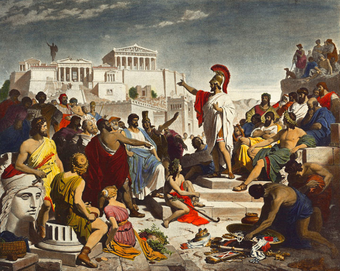Modern Democracy, Is it really worth the hype?
In the chaotic modern day world of politics: the lies, the scandals, the voting, the tensions and the inner party feuds we often forget and lose sight of the essence of our governmental system, one founded in ideals of freedom and equal opportunities for all citizens. But are we truly free? Are we truly all equal in our opportunities, in our ability to affect governance? Is our vote truly enough? To answer these questions we must reflect on the origins of Democracy, its original ideals, and whether perhaps we can learn a little from this ancient system of governance.
As always we must first start with the etymology. The term Democracy derives from two greek words, Demos, meaning the people or the general masses, and Kratos, meaning rule or power. Combined of course this makes democracy by definition the rule of the people, as opposed to monarchy or aristocracy, the rule of one and the rule of the “best/highest” accordingly. One could say that the word used to describe our current system would be Timocracy, or rule by the most qualified (according to those who voted for them of course). In fact from an ancient perspective of democracy our democracy wouldn’t be a democracy at all, there’s wayyyyy too much voting involved and clearly not enough ostracism by the looks of things!
So what was ancient democracy and how can we compare it to our modern day perceptions? Ancient Athenian Democracy was first developed, as you could guess, in the city of Athens in Greece around the 5th century BC. This original model of democracy decided most of its governance through the process of sortition (basically picking names out of a hat) out of those that had volunteered, no voting required. Now you may wonder how such a system, run by whatever rabble was willing to try their hand, could work in practise. Well of course there were monthly check ups to see if people were carrying out their job correctly, as well as the much desired process of ostracism, a vote by the people on what power-hungry government official to chuck out, with only 6,000 votes being needed to say bye bye to your favourite would be tyrant.
Not only did Ancient Athenian Democracy provide a much greater amount of opportunity to people of all backgrounds and abilities to try their hand at governance, well if you were an Athenian citizen that is… and a guy.(don’t worry I definitely don’t wish for that particular ideal to be considered in the modern day) But , unlike the restrictive house of lords and commons of our so called democratic British system, it also allowed for the participation of all in the discussions within the “assembly” (the ancient houses parliament) and the ability for all to vote directly on decisions made within the assembly. The only restriction? Whether you could turn up on the day.
Simply imagine the freedom, the opportunity for change. No longer would we be oppressed by snap elections and snap… well everything it seems. No longer would the public be called to action only in matters of great….”apparent“…. Importance. Imagine how many more people would be interested in politics, in changing the world, if all they had to do to get involved was put themselves forward, to turn up on the day, without the need for any levels of charisma or glib political promises to be able to make a difference.
But we must not fall into the trap, like many before, of seeing this ideal state through the ever blinding lens of “rose-tinted goggles”. There was never a “gold” age of democracy, every governance has its faults. And so it was too that the Ancient Athenian system had its many…many faults… For starters this was not a time devoid of political lies and turmoil….oh no, far from it. As you would expect those “charismatic” speakers that now dominate the political landscape still remained ever present in the assemblies, influencing hundreds if not thousands of sometimes completely uneducated masses to vote for their reform, their proposition. Propositions that at the best of times solved an economic crisis for a good year or two, and at worst almost committed grievous acts of genocide… oh how times change. Another problem I have yet to mention is that there was one specific position that still required a vote for obvious reasons (cant be having inept military leaders now can we…), that being the military generals or “stratagoi” as they were called. These figures, due to being the only ones in power with the approval/ vote of the people, in turn became the most powerful, at times verging on becoming complete tyrants. In reality Athens, like one could say of today, had become a Democracy in name alone, ruled by its first citizen.
So then what does all this mean for the state of our current democracy? What have we learnt? Well firstly we’ve learnt that by definition we live in a timocracy at best, that perhaps we dont have as much power as we could have and that maybe voting isn’t as democratic as we once thought it was. Perhaps we could try and implement some of these Ancient ideals, maybe we should consider greater opportunities and involvement in politics for the every-man, or perhaps such a notion is too unrealistic (especially due to the current population size). Perhaps we could learn from the mistakes of Democracy’s ancestor,to try not to be so persuaded by others, to think firstly from our own minds before following the minds of others. All I know is that maybe from now on we shouldn’t be asked to vote on decisions we don’t have enough experience to decide upon.















Post Comment
You must be logged in to post a comment.